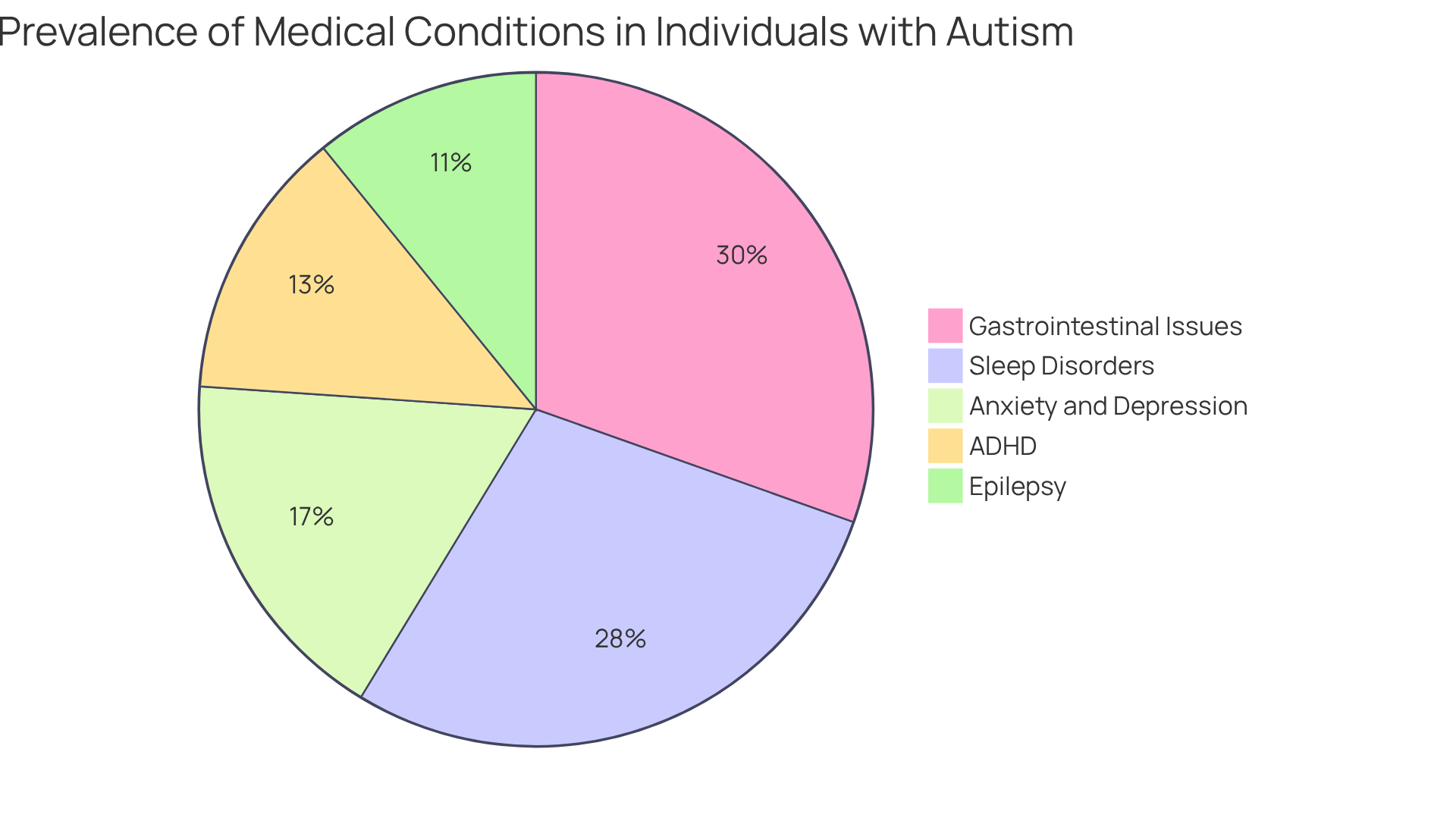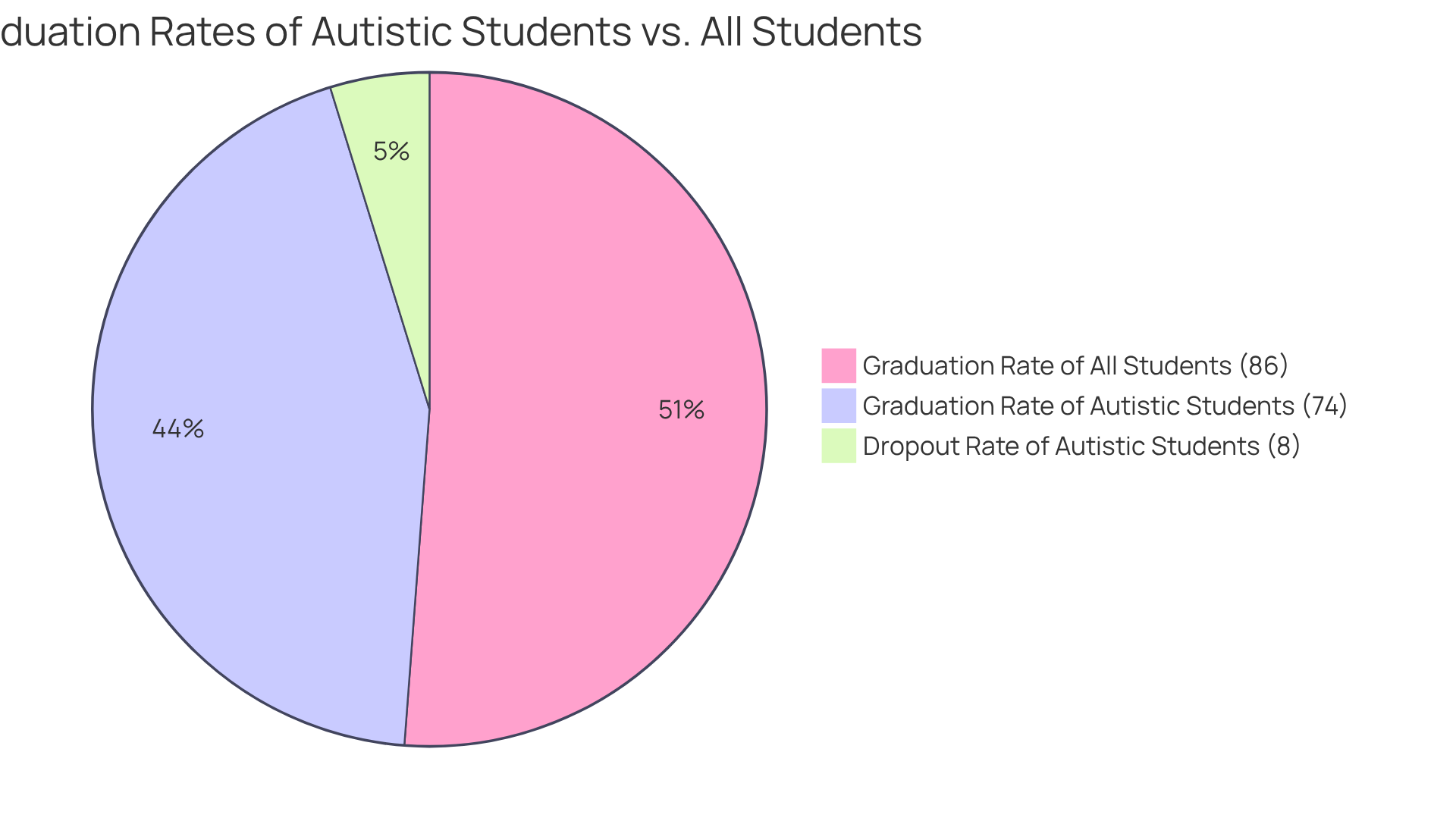Overview
This article aims to foster a deeper understanding of the medical conditions associated with Autism Spectrum Disorder (ASD), with the goal of enhancing support for those affected. Many individuals with autism face additional medical challenges, such as:
- Gastrointestinal issues
- Epilepsy
- ADHD
- Anxiety
- Sleep disorders
This highlights the critical need for comprehensive care and early intervention strategies. By addressing these related conditions, we can significantly improve the overall development and well-being of individuals with ASD. Together, we can work towards a more supportive environment that nurtures their unique needs.
Introduction
Understanding Autism Spectrum Disorder (ASD) is essential, not only for those diagnosed but also for families and communities striving to provide effective support. With approximately 1 in 36 youths in the U.S. diagnosed with this multifaceted condition, the implications of associated medical issues—ranging from anxiety to epilepsy—are profound and often overlooked. How can we deepen our understanding of these co-occurring conditions to enhance support strategies and foster a more inclusive environment for individuals on the spectrum? This article delves into the complexities of autism, the importance of early diagnosis, and the benefits of tailored interventions, illuminating pathways for improved outcomes. Together, we can explore these challenges and discover ways to better support our loved ones.
Define Autism and Its Spectrum
Autism Spectrum Disorder (ASD) is a multifaceted developmental condition that can profoundly impact individuals and their families. It is characterized by enduring challenges in social interaction, communication, and behavior. The term 'spectrum' reflects the diverse range of symptoms and abilities that people with developmental disorders may exhibit. For example, while some individuals may face significant difficulties with daily living skills, others might demonstrate extraordinary talents in areas such as mathematics or the arts.
Recent studies reveal that approximately 1 in 36 youths in the U.S. are diagnosed with ASD, and globally, about 1 in 100 young individuals has autism. This highlights the widespread nature of this condition. Notably, boys are diagnosed at rates of 4.3% compared to 1.1% for girls, making it crucial to understand these differences to create tailored support strategies that meet the unique needs of each person.
Furthermore, children from lower-income households are diagnosed at an average age of 4.7 years, while those from higher-income families are diagnosed at 5.2 years. This disparity underscores the urgent need for equitable access to diagnosis and intervention services. Additionally, many individuals on the autism spectrum may also experience medical conditions associated with autism, including:
- Epilepsy
- Depression
- Anxiety
- ADHD
By fostering a thorough understanding of ASD, we can promote an inclusive environment that enhances the effectiveness of interventions. Together, we can empower those on the autism spectrum to thrive within their communities. If you have experiences or insights to share, we encourage you to connect with us and explore resources that can support you and your loved ones.
Explore Medical Conditions Commonly Associated with Autism
Individuals with autism often face a range of medical conditions that can complicate their diagnosis and treatment. Among the most common are:
- Gastrointestinal (GI) Issues: Many autistic individuals experience GI problems, leading to discomfort and behavioral challenges. Research shows that these issues may affect up to 70% of children on the spectrum, underscoring the need for effective management strategies. Temple Grandin highlights the importance of exposure to various activities, which can be vital in addressing these challenges.
- Epilepsy: This neurological condition is notably more prevalent among those with autism spectrum disorders, with studies indicating that around 20-30% may also experience epilepsy. This situation necessitates careful monitoring and tailored management plans to address both conditions effectively.
- Attention-Deficit/Hyperactivity Disorder (ADHD): A significant number of individuals with autism also exhibit signs of ADHD, impacting their concentration and behavior. The overlap between the medical conditions associated with autism can complicate treatment strategies, requiring a nuanced understanding of each person's unique needs.
- Anxiety and Depression: Mental health challenges are common among autistic individuals, often necessitating integrated therapeutic methods. Studies suggest that as many as 40% of people on the autism spectrum may encounter anxiety disorders, highlighting the importance of incorporating mental health considerations into treatment strategies.
- Sleep Disorders: Sleep challenges are prevalent in the autistic population, affecting overall well-being and exacerbating other symptoms. Research indicates that approximately 50-80% of autistic individuals face sleep problems, making it essential to include sleep management techniques in their care.
Recognizing and understanding the medical conditions associated with autism is crucial for both parents and professionals, as this knowledge enables them to provide comprehensive care and support tailored to the specific needs of those on the spectrum. The Els for Autism Adult Day Training Program exemplifies how targeted support can lead to improved outcomes for individuals facing these challenges.

Highlight the Importance of Early Diagnosis and Customized Support
Early diagnosis of autism is crucial, as it allows for prompt interventions that can significantly enhance a young person's development. Research shows that individuals diagnosed before the age of three are more likely to achieve substantial improvements in communication, social skills, and overall functioning. For instance, early intervention can result in a remarkable 65% improvement in social symptoms within just one to two years. Moreover, early intervention can save approximately $1.3 million per individual over their lifetime, underscoring the long-term financial benefits of timely support.
Customized support, such as individualized education plans (IEPs) and tailored behavioral therapies, effectively addresses specific challenges while building on the individual's strengths. Real-life examples reveal that young individuals who receive early intensive behavioral intervention often show significant improvements in their daily lives. As Nitzan Gabbay-Dizdar notes, "Early diagnosis of autism in the community is associated with marked improvement in social symptoms within 1-2 years."
Parents are strongly encouraged to seek assessments and advocate for their child's needs as early as possible. This proactive approach maximizes the potential benefits of intervention and fosters a nurturing environment for development. It’s also important to recognize that:
- 74% of autistic students in the U.S. graduate with a diploma compared to 86% of all students
- 8% of autistic students do not finish high school
This statistic highlights the urgent need for early support, ensuring that every child has the opportunity to thrive.

Conclusion
Autism Spectrum Disorder (ASD) is a complex developmental condition that affects individuals in diverse ways, highlighting the importance of tailored support and understanding. It is essential to recognize the multifaceted nature of autism, including its associated medical conditions, to foster an inclusive environment that empowers individuals on the spectrum to thrive.
This article sheds light on several key medical conditions commonly associated with autism, such as:
- gastrointestinal issues
- epilepsy
- ADHD
- anxiety
- sleep disorders
These co-occurring conditions can complicate diagnosis and treatment, making it imperative for caregivers and professionals to adopt a comprehensive approach to care. Early diagnosis and customized support strategies, such as individualized education plans, have been shown to significantly enhance outcomes. Timely interventions can lead to substantial improvements in social skills and overall functioning.
In light of these insights, it becomes clear that proactive measures are essential in supporting individuals with autism and their families. Advocating for early assessments and tailored interventions not only maximizes potential benefits but also ensures that every child has the opportunity to succeed. By fostering a deeper understanding of autism and the associated challenges, communities can come together to create supportive environments that uplift those on the spectrum, paving the way for a brighter future.
Frequently Asked Questions
What is Autism Spectrum Disorder (ASD)?
Autism Spectrum Disorder (ASD) is a multifaceted developmental condition characterized by enduring challenges in social interaction, communication, and behavior. It reflects a diverse range of symptoms and abilities among individuals.
How prevalent is autism?
Approximately 1 in 36 youths in the U.S. are diagnosed with ASD, and globally, about 1 in 100 young individuals has autism.
Are there differences in diagnosis rates between genders?
Yes, boys are diagnosed with autism at rates of 4.3% compared to 1.1% for girls.
What is the average age of diagnosis for children from different income backgrounds?
Children from lower-income households are diagnosed at an average age of 4.7 years, while those from higher-income families are diagnosed at 5.2 years.
What medical conditions are commonly associated with autism?
Individuals on the autism spectrum may experience associated medical conditions such as epilepsy, depression, anxiety, and ADHD.
How can understanding ASD promote inclusivity?
By fostering a thorough understanding of ASD, we can create an inclusive environment that enhances the effectiveness of interventions and empowers individuals on the autism spectrum to thrive within their communities.




